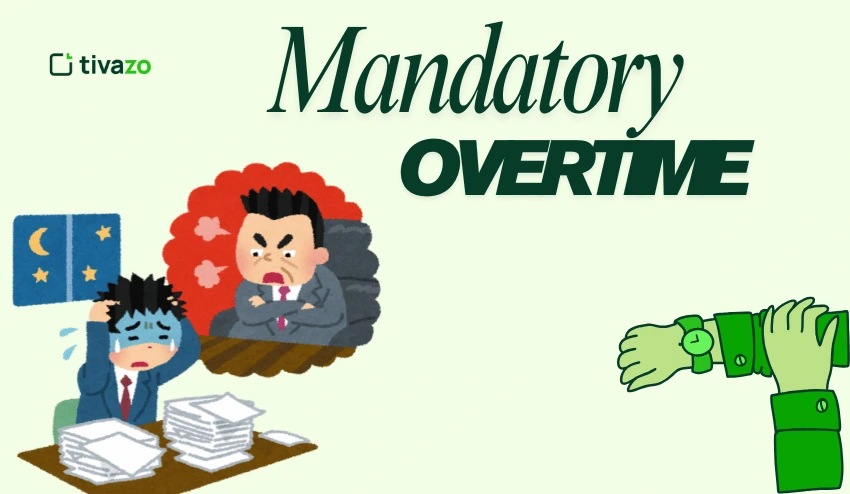Mandatory overtime is both a work requirement and a component that can influence an employee’s personal life and a business’s status of operations. Both employers and employees must understand the rules, legality, and effects of mandatory overtime. If handled incorrectly, mandatory overtime can have negative effects on work-life balance, employee morale, and productivity. So many organizations engage in mandatory overtime during busy seasons or emergencies that it is important for employees to know their entitlements.
This guide is meant to cover all aspects, including allowable hours, notice periods, and legal issues. We also address many frequently asked questions and provide tips for managing or avoiding mandatory overtime responsibly, while ensuring both compliance and employee health.
Key Highlights:
- Defining Mandatory Overtime
- Is Mandatory Overtime Legal?
- What is Required Overtime?
- How Much Notice is Required for Mandatory Overtime?
- Is Overtime Required?
- Ways to Avoid Mandatory Overtime
- Can an Organization Mandate Overtime?
- Valuable Tools for Dealing with Compulsory Overtime
Defining Mandatory Overtime
Mandatory overtime refers to an employer’s requirement for employees to work beyond the scheduled hours required of them. In contrast, voluntary overtime is an optional choice for the employee. However, with mandatory overtime, the employee is required to work the mandatory overtime regardless of whether they want to. If the employee refuses to work overtime, the employer may follow the protocols outlined in their company policy or local labor laws, with possible disciplinary actions. Consider these 7 factors to help clarify mandatory overtime:
1. Mandatory Overtime
Employees must accept mandatory overtime requests unless authorized not to do so legally.
2. Pay for Overtime
Employers usually have to pay employees for working overtime, per labor laws.
3. Impact on Work-Life Balance
There can be too much mandatory overtime, leading to exhaustion, burnout, stress, and lower productivity.
4. Legal Requirements
Employers must comply with predominantly local laws on limits to hours worked and notification.
5. Industries with habitual mandatory overtime
Healthcare, manufacturing and other production workplaces, retail, and emergency services typically have mandatory overtime.
6. Employee Rights
Employees just need to be knowledgeable about their rights to refuse or bargain over overtime under certain conditions.
7. Business Need
Mandatory overtime is often used as a necessity of the business, for example, when an expanding project has urgent deadlines, or there is an unanticipated/undocumented shortage in staffing.
If all parties understand and can utilize these items around compulsory overtime, they can manage the inevitable better, maximize compliance, and enhance employee satisfaction.
Is Mandatory Overtime Legal?
The legality of mandatory overtime is dependent on the country, state, and industry. In general:
United States
Employers can mandate overtime, but they have to pay overtime wages under the Fair Labor Standards Act (FLSA). Non-exempt employees are entitled to be paid 1.5 times their regular hourly rate for every hour they work over 40 hours in a single week.
California
Labor laws are often stricter. Employers must pay various overtime pay rates after employees have worked a specific number of hours, such as after an 8-hour shift in a single day or after an employee has worked 40 hours in a given week. Employers may need to pay double time if they require an employee to work “excess” hours; for example, if an employee works more than 12 hours in one day or more than 8 hours on the employee’s seventh consecutive work day.
Other Countries
Local laws can vary widely, so it is critical to know what your local labor laws state. For example, some countries limit the number of overtime hours an employee can work in a single week and may require the employee to “consent” to work overtime specifically.
Ways to Manage Mandatory Overtime
As an employee, you may be able to manage your mandatory overtime or even avoid it altogether by:
Understanding Your Contract Obligations
It’s important to understand how things worked in your contract regarding working overtime. To understand your rights and obligations, you need to be clear about how often you may be required to work overtime and on what basis.
Managing Your Workload with Your Manager
Preparing for a discussion with your manager is a good approach to shifting the dialogue about mandatory overtime. If you can discuss your workload and suggest solutions to mitigate unnecessary overtime, it may be a way to find common goals between your manager’s needs and your well-being.
Keep Track of All Hours Worked
Document your timetable and hours worked to manage “out of control” mandatory overtime. Keeping records is valuable if you need to refer back to HR or management about discrepancies in overtime requests or hours worked.
Use Employment Law
Excessive or mandatory overtime can violate local/ provincial employment laws. Consult with HR or your local labor authorities to challenge or contest excessive overtime that breaches employment regulations. When you know your legal entitlements, you will equip yourself to better defend against poor practices.
State Your Availability
You can communicate, appropriately, your requirement for work/life balance by letting the supervisor/ department head know your limitations. The more aware they are, the less likely they are to consistently demand your involvement outside of planned working hours.
Prioritize Tasks
Ensure you are addressing priority tasks and not allowing additional hours to become mandatory to your work, which may save you hours from being included as well. Managing the tasks you have to complete may help limit mandatory overtime.
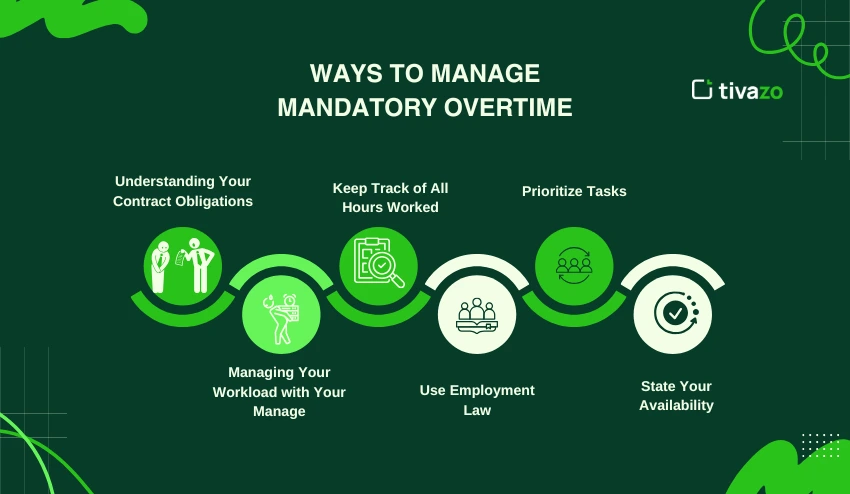
What is Required Overtime?
There are no limits on mandatory overtime; it depends on:
- Company policies
- Employment contracts
- Legal limits in your country or state
| Type of Employee | Overtime Threshold |
| Non-exempt employees | Over 40 hours of work weekly (FLSA) |
| California employees | Over 8 hours per day or 40 hours/week. |
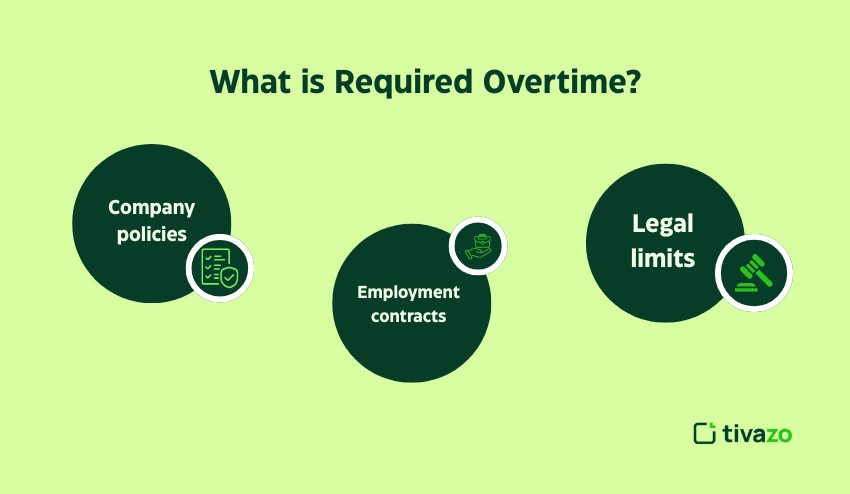
How Much Notice is Required for Mandatory Overtime?
Notice requirements for mandatory overtime depending on company policy, industry, whether one is unionized, and if there are local labor laws:
- Standard Notices: Some companies may let you know 24-48 hours in advance of the mandatory overtime. This way, you can organize your responsibilities to maintain your work-life balance.
- Short-Term or Emergency Notices: In some industries like healthcare, manufacturing, or retail, employers may send short-term notices for the mandatory overtime because of an urgent operational need or an unexpected staffing shortage.
- Employer Best Practices: While there are no regulations governing notice and/or limitations, communication is key. The employer should clearly define its policy on e in a collective agreement or employee handbook that delineates how much notice an employee may receive as one effective way of doing this.
- Employee Rights: Employees should be ”in the know” about their rights in terms of what notice they are entitled to have for overtime. Employees may be aware that excessive, short, or unreasonable notice might be contrary to the labor laws where they are working.
- Planning: Sufficient scheduling and forecasting time to alleviate unexpected imminent mandatory shifts can minimize unplanned last-minute overtime, benefit employees, and the employees’ agency.
By understanding what notices are reasonable about mandatory overtime, employees can better prepare to fulfill the unnecessary anticipated work demands, and employers can also ensure fairness while remaining compliant with working laws, and maintain the morale of all employees in the workplace.
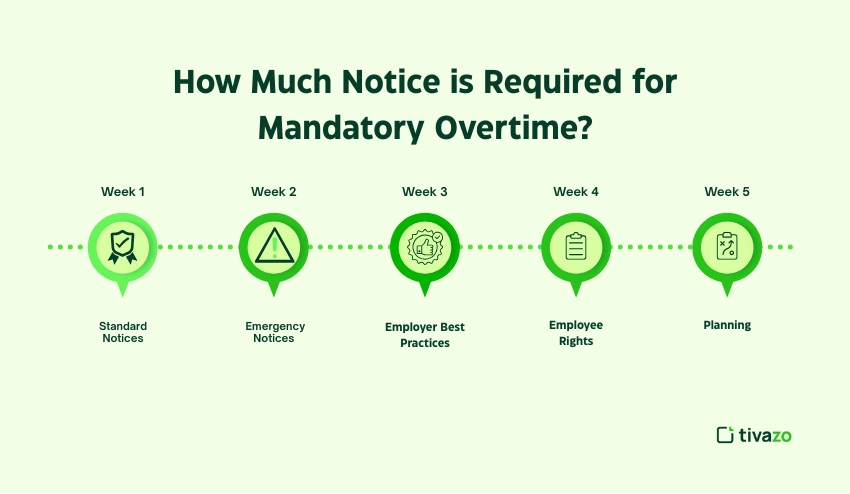
Is Overtime Required?
Overtime can be required depending on:
- Employment contract
- Company policy
- Business needs (such as peak/busy times, emergency work)
Nevertheless, employees may have rights to refuse under certain labor laws and/or union contracts.
Ways to Avoid Mandatory Overtime
Employees can manage, as well as avoid, mandatory overtime by:
- Clarifying your Contract: Understand your rights and obligations regarding mandatory overtime. Read your contract to understand how often and under what conditions you can be required to work overtime.
- Talking About Your Workload: Your manager is responsible for managing the workload of their employees. Having an open discussion with your manager regarding your workload, the quality of your output, and ways to avoid mandatory overtime may be considered as potential improvements to heavy workloads.
- Keeping good records: Document your hours worked to protect yourself from the abuse of mandatory overtime. If situations arise that require talking with HR or management, your records will establish your written proof of concerns regarding mandatory overtime.
- Using labour laws: If mandatory overtime is excessive or more than is allowed under local policy, then consultation with HR, employee unions, or the governing authority may be appropriate in protecting your rights and entitlements.
- Creating boundaries: Be honest and sincere with your availability to avoid unnecessary overtime professionally.
- Prioritize and delegate important tasks: Concentrate on the most important task of the day and delegate as much as possible before working excessive hours.
- Creating flexible options: Offer flexible options such as shift exchanges, flexible hours, and remote options, which allow your employer to accommodate their business needs without excessive mandatory options, leaving disgruntled employees
By doing these activities and being mindful of their rights and employee wellness, employees can take proactive measures to reduce mandatory overtime in their lives while also ensuring they comply with labour regulations.
Can an Organization Mandate Overtime?
Yes, organizations can mandate their employees to work overtime for business needs. However:
- They must comply with laws regarding maximum hours.
- Compensation for all hours must be within legal parameters.
- Good communication and fair notice to the employee are critical for employee satisfaction and morale.
Can An Employer Make You Work Overtime Without Notice?
- Short answer is: Yes, by company policies and applicable laws, then maybe.
- Certain situations with an urgent business need will require immediate overtime.
- Best Practice: Designated notices for overtime, wherever possible, allow for legal compliance and give employees notice/morale.
Is Overtime Mandatory In California?
- Yes, it is mandatory at certain times: California law requires employees’ overtime pay at time and a half once they have worked eight (8) hours in a day or forty (40) hours in a work week, as specified in California law.
- There are exceptions to mandatory payment for overtime: For example, salaried employees or “exempt” positions may not be entitled to overtime pay.
- Employees should also understand their contracts, which typically outline employment status and refer to the California labor code for specific regulations.
Valuable Tools for Dealing with Compulsory Overtime
- Plan Ahead: If your organisation is able, plan your projects instead of facing surprise compulsory overtime.
- Clear Policies: Create policies that clearly state your expectations for employees in relation to compulsory overtime.
- Documentation: Use an instrument (a timesheet, an ad hoc spreadsheet, or an application) that allows for the documentation of hours and for employees to be able to confirm their compliance with the organisation’s policy.
Be Attentive to the Well-Being of Employees: Monitor employee workloads and stress levels to ensure employees do not experience burnout.
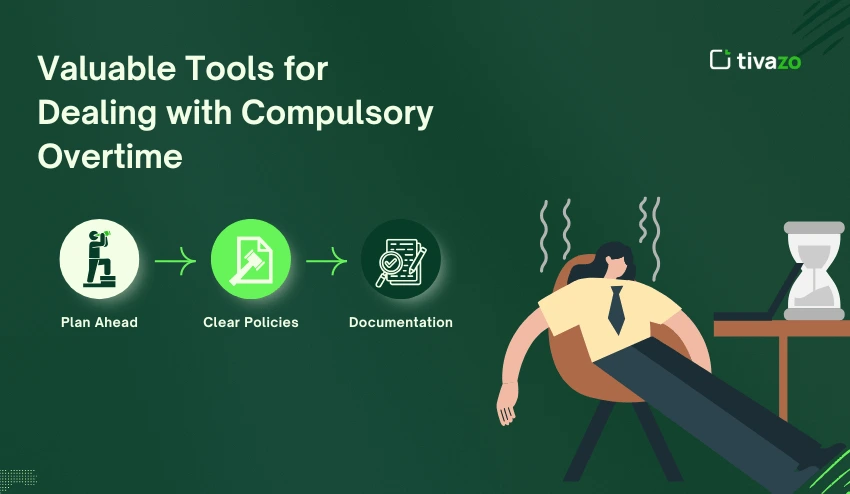
Mandatory Overtime: Pros and Cons
| Pros | Cons |
| To accommodate urgent business needs | Employee fatigue, stress, and burnout |
| Increased productivity during times of need | Decreased motivation and job satisfaction |
| Ability to meet critical project deadlines | Risk of legal consequences if non-compliant with the current labor law |
Conclusion
Mandatory overtime is an important area for both parties to manage, with the employer and employee needing to fulfil their respective duties. For the employee, it is important to understand what one’s rights are when it comes to mandatory overtime. For example, notice, hours worked, and protection are important areas in preventing exploitation and maintaining a work-life balance. For the employer, it also needs to ensure there is compliance with labour laws, notify staff when members are required to work overtime, and ensure the workloads are planned to minimize unwanted overtime.
Employers should employ fair policies, accurately track hours worked, and offer options when reasonable to attribute in combating the drawbacks of mandatory overtime, improve job satisfaction, and maintain productivity in the workplace.
